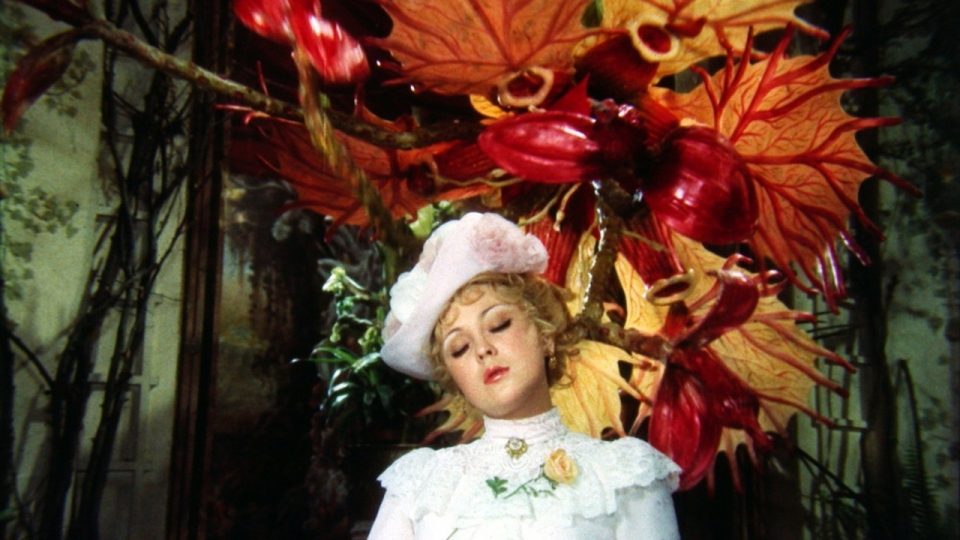Having premièred on 1 August 1978 in the Prague Blaník cinema, Adela Has Not Had Supper Yet (Adéla ještě nevečeřela) was screened four times a day for fifteen weeks thanks to the enormous interest of audiences. It quickly became one of the most popular films of the 1970s – or of the entire „Normalization“ period, for that matter – a period in which entertainment not contaminated by ideological manipulations was so scarce. However, the free demonstration of uninhibited playfulness was a quality present in Oldřich Lipský’s best works already since 1964, when his cowboy film parody Lemonade Joe, or the Horse Opera (Limonádový Joe aneb Koňská opera) came to the cinemas.
Like Joe, also Adela is a product of Lipský’s and screenwriter Jiří Brdečka’s enchantment with literary and film pulp fiction, which by then had been half-forgotten in Czechoslovakia and was re-emerging only through parodies. In Lipský’s film, Countess Thunová (Květa Fialová) listens to her pretty companion Karin (Olga Schoberová) reading to her from the Czech edition of a pulp magazine featuring detective Nick Carter. However, it was already in 1886 when the „greatest American detective“ first addressed English-speaking readers, and the character had also appeared in films since the silent era.
Nevertheless, Brdečka together with Lipský brought the unbeatable, brilliant, and manly Nick with his sophisticated gadgets to Art Nouveau Prague, at the turn of the century. The character of a grandiose, naive foreigner sheds affectionately ironic light on the hypothetical Czech nature. This is represented by the police commissioner Ledvina (played by the amazing Rudolf Hrušínský) – a laconically jovial, hedonistic connoisseur of the Prague underworld (and of Pilsner beer, Olomouc smelly cheese and slapping techniques).
Following a mysterious disappearance in the Countess’s household, the two detectives get a lead on Baron von Kratzmar (Miloš Kopecký). Nicknamed „the Gardener“, the villain has grown a huge carnivorous plant named Adela whose appetite is always reliably triggered by Mozart’s lullaby. He wants to use Adela as an instrument of revenge against his lifelong enemy – the retired high school botany teacher Boček (played by the proven Ladislav Pešek). Also in play is the teacher’s naive granddaughter Květuška (perfectly played by Naďa Konvalinková), who enchants Nick with her beauty and the way she can roll a strudel.
Born out of artist Jan Švankmajer’s pleasurable surrealist fantasies, Adela remains the main but not the only attraction of Lipský’s film. It is full of situational humour and wordplay often based on the confrontation of the „perfect“ detective with the illogical and unpredictable Czech environment. With its fast-motion sequences and gags making use of photographic print toning, among other things, the film refers to early film poetics. The costume designer Theodor Pištěk and set designer Vladimír Labský helped make the atmosphere of Art Nouveau Prague complete. The experienced composer Luboš Fišer arranged the music while behind the camera was prominent Czechoslovak New Wave cinematographer Jaroslav Kučera.
As for the cast, Oldřich Lipský assembled the tried and tested actors from Lemonade Joe. With Joe‚s international success in mind, he had originally even wanted to cast Robert Redford in the main role. The Hollywood star claimed to like the screenplay, but the Barrandov Studio offer obviously wasn’t lucrative enough. Jiří Kodet successfully passed the casting and screen tests; however, since he didn’t fit into the costume made in advance, it was the Slovak actor Michal Dočolomanský who got the role in the end (dubbed into Czech by František Němec).
Like with Lemonade Joe and later also the Jules Verne parody The Mysterious Castle in the Carpathians (Tajemství hradu v Karpatech, 1981), Lipský cast well-known or distinctive actors. A fun aside is screenwriter Brdečka’s cameo appearance as a colonel in the cabaret scene. As a stylish dandy in this scene, we can also briefly see the director’s friend Myrtil Frída, the legendary film historian, admirer of and expert on pulp pop culture, who died only nine days after Adela’s ceremonial première at the age of 58.
Lipský’s Adela mesmerized not only the domestic audience. It received the Artwork Award at the Festival of Czech and Slovak Films in České Budějovice and the Award for Best Cinematography at the Sitges Film Festival specializing in fantasy and horror films. Among other festivals, it also competed at the Chicago International Film Festival. In recent years, the film has been released on DVD four times and continues to reach new generations of viewers through the TV screen.
Adela Has Not Had Supper Yet (Adéla ještě nevečeřela, Czechoslovakia, 1977), director: Oldřich Lipský, screenplay: Jiří Brdečka, Oldřich Lipský, director of photography: Jaroslav Kučera, music: Luboš Fišer, editor: Miroslav Hájek, cast: Michal Dočolomanský, Rudolf Hrušínský, Miloš Kopecký, Ladislav Pešek, Naďa Konvalinková et al. Filmové studio Barrandov, 105 min.


